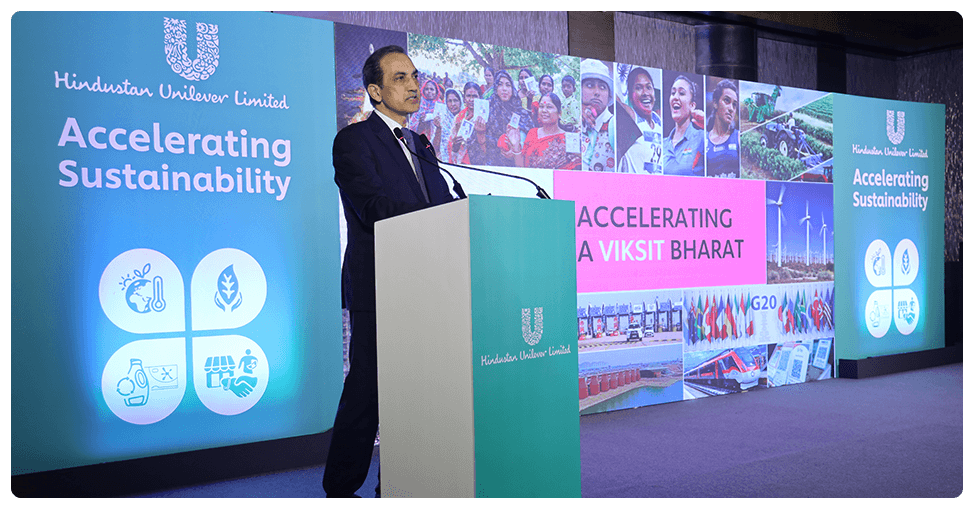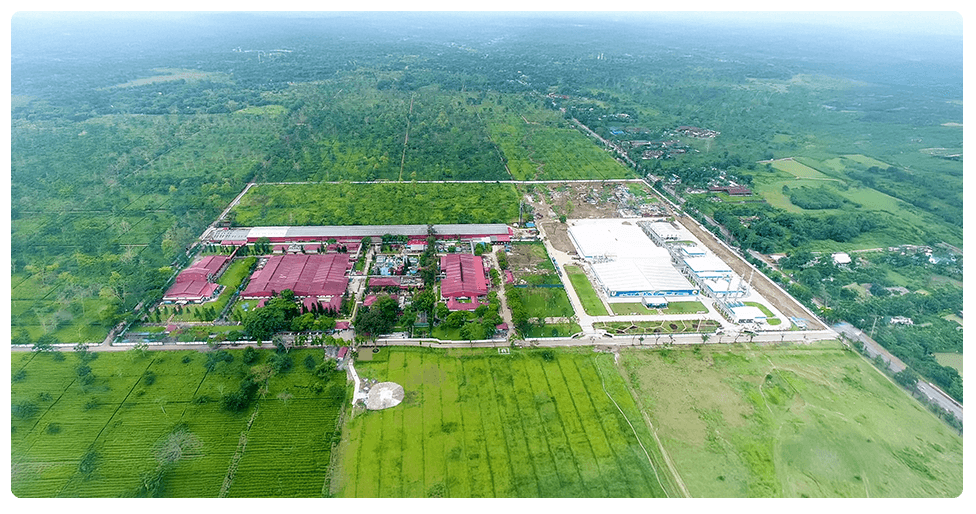
Management and Process Disclosures
Our ESG objectives are both ambitious and realistic, allowing us to seamlessly integrate them into our business operations. By leveraging our brands as a force for good, powered by purpose and innovation, we aim to drive transformative change and contribute positively to society and the environment. Our robust governance framework supports our ESG objectives, ensuring responsible, transparent, and sustainable business practices.
Message from Our
Leadership

"Our purpose is to succeed by upholding high corporate standards, positively impacting communities and the environment. By fostering a culture of integrity, responsibility, and sustainability, we aim to create lasting value for our stakeholders and contribute to a better world. Our commitment to ethical practices and social responsibility drives us to innovate and lead with purpose, ensuring a brighter future for all.”
BP Biddappa Executive Director and Chief People,
Transformation and Sustainability Officer

Independent Chair
of ESG Committee at Board level

CoBP
aligning with UNGC principles and ILO guidelines

0%
Independent Directors on ESG Committee

ESG Policy
approved by
the Board
Policy and management processes
National Guidelines on Responsible Business Conduct Principles
 PRINCIPLE 1
PRINCIPLE 1
Businesses should conduct and govern themselves with integrity, and in a manner that is ethical, transparent, and accountable.
 PRINCIPLE 2
PRINCIPLE 2
Businesses should provide goods and services in a manner that is sustainable and safe.
 PRINCIPLE 3
PRINCIPLE 3
Businesses should respect and promote the well-being of all employees, including those in their value chains.
 PRINCIPLE 4
PRINCIPLE 4
Businesses should respect the interests of and be responsive to all its stakeholders.
 PRINCIPLE 5
PRINCIPLE 5
Businesses should respect and promote human rights.
 PRINCIPLE 6
PRINCIPLE 6
Businesses should respect and make efforts to protect and restore the environment.
 PRINCIPLE 7
PRINCIPLE 7
Businesses, when engaging in influencing public and regulatory policy, should do so in a manner that is responsible and transparent.
 PRINCIPLE 8
PRINCIPLE 8
Businesses should promote inclusive growth and equitable development.
 PRINCIPLE 9
PRINCIPLE 9
Businesses should engage with and provide value to their consumers in a responsible manner.
| Disclosure questions | P1 Ethics & integrity |
P2 Sustainable products |
P3 Employee well being |
P4 Stakeholders |
P5 Human rights |
P6 Environment |
P7 Regulatory requirement |
P8 Inclusive growth |
P9 Consumer and IT |
|
|---|---|---|---|---|---|---|---|---|---|---|
| 1. |
|
Yes, we have an ESG Policy, approved by our ESG Committee, which covers all National Guidelines on Responsible Business Conduct (‘NGRBC’) principles. In addition to the ESG Policy*, we have various other policies relevant to NGRBC principles. | ||||||||
| 1. |
|
Yes | ||||||||
| 1. |
|
The policies can be accessed via the Link and some internal policies applicable to employees are available on our intranet. | ||||||||
| 2. | Whether the entity has translated the policy into procedures. (Yes/No) | Yes | ||||||||
| 3. | Do the enlisted policies extend to your value chain partners? (Yes/No) | Yes, our Code of Business Principles (CoBP) and Responsible Partner Policy (RPP) extend to value chain partners. | ||||||||
| 4. | Name of the national and international codes/certifications/ labels/standards (e.g. Forest Stewardship Council, Fairtrade, Rainforest Alliance, Trustea) standards (e.g. SA 8000, OHSAS, ISO, BIS) adopted by your entity | Our CoBP conforms to UNGC guidelines and ILO Principles | Farm Sustainability Assessment, Rainforest Alliance, TrustTea, Forest Stewardship Council, Roundtable on Sustainable Palm Oil, Round Table for Responsible Soya, FSSC 22000 | Unilever Occupational Health & Safety Framework based on the OHSAS Safety Management system | Unilever Environmental Care Framework based on ISO 14001 standards | Our CoBP conforms to UNGC guidelines and ILO principles | Unilever Environmental Care Framework standards based on ISO 14001 standards | Tax Transparency policy is based on OECD principles | CSR disclosures pursuant to Section 135 of the Companies Act, 2013 |
Cyber Security
Standards are
aligned to the NIST-CSF Advertising Standards Council of India (ASCI) – Code on Fair Advertising to Consumers. (We are a founder member of ASCI) |
| 5. | Specific commitments, goals, and targets set by the entity with defined timelines, if any. | We have established Environmental, Social, and Governance (ESG) Goals as part of our
Sustainability Strategy. Our ambitious agenda addresses critical
issues that matter deeply to our consumers and stakeholders, including climate action,
protecting and regenerating nature, managing plastics, and
improving livelihoods. The ESG Goals form a part of the Integrated Annual Report.
The ESG Goals form a part of the Integrated Annual Report.
|
||||||||
| 6. | Performance of the entity against the specific commitments, goals and targets along-with reasons in case the same are not met. | We constantly monitor the performance towards the goals and take adequate actions
wherever required. We have a robust governance mechanism to
monitor the progress of our goals. The Sustainability leadership team, chaired by the Chief
People, Transformation and Sustainability Officer, reports
the progress to the Chief Executive Officer & Managing Director, and Management Committee
quarterly. Our ESG Committee, chaired by an Independent
Director and comprising of a majority of Independent Directors, assists the Board in overseeing
the vision and focus on our strategy relating to ESG as
well as monitoring the progress against the stated vision and reviewing the policies and
practices, initiatives and goals about ESG, ensuring that they
remain effective.  For details, refer to the ESG highlights section of the Integrated
Annual Report.
For details, refer to the ESG highlights section of the Integrated
Annual Report.
|
||||||||
*The other policies relevant to respective NGRBC Principles are listed below
P1: Code of Business Principles (CoBP), Policy on Conflict of Interest, Policy on Prevention of Insider Trading (Share Dealing Code) , Anti-corruption and Anti-bribery Policy, Board Familiarisation Programme, Corporate Governance Code, Policy on Related Party Transactions, Whistle Blower Policy, Policy for Determination of Materiality of Events, Code of Conduct for Board and Members of Senior Management
P2: Responsible Partner Policy (RPP), Business Partner Code, Quality Policy, Sustainable Agriculture Principle (SAP)
P3: CoBP, Safety & Health Policy, Equal Opportunity Policy, Disability Accommodation Policy, Parental Leave Policy, Prevention of Sexual Harassment Policy (POSH), Affirmative Action Policy, Education Assistance Policy, Reward Policy, Gender Transition Policy, Career Break Policy, Location flexibility and Split Family Arrangement, Travel Policy for New Parents, Foster Kinship Caregiver Policy, Retirement Policy
P4: CoBP, CSR Policy, Corporate Governance Code
P5: CoBP, Prevention of Sexual Harassment Policy (POSH), Policy to Support Survivors of Abuse, Whistle Blower Policy, Board Diversity Policy
P6: Environment, Health & Safety Policy, CoBP
P7: CoBP, Anti-trust and Fair Competition (as part of CoBP)
P8: Supplier Diversity & Inclusion Programme, CoBP, CSR Policy
P9: Cyber Security Policy, Data Privacy Policy, Quality Policy
7. Statement by director responsible for the business responsibility report, highlighting ESG related challenges, targets and achievements (listed entity has flexibility regarding the placement of this disclosure)
Dear Stakeholders,
I am pleased to share our Business Responsibility and Sustainability Report (BRSR) for the Financial Year 2024-25. This report aims to update you of our sustainability performance driven by our efforts to create a positive impact on the environment and society.
Sustainability Embedded In Our Strategy
Our new strategy, ‘ASPIRE: Unlocking a Billion Aspirations’, aims to unlock growth for the business and is underlined by the key pillar of sustainability. We have been driving an ambitious sustainability agenda for decades. Yet, in the face of ever-growing economic, environmental, and social challenges, we are evolving our approach. Now is the time to focus on delivering impact by making sustainability progress integral to business performance.
We will continue to focus on four sustainability priorities – Climate, Nature, Plastics, and Livelihoods. We will be scaling our proven models across these pillars to create a larger impact. We truly believe that embracing sustainability is the only way for businesses to remain relevant in the future.
Accelerating ESG Leadership
At HUL, we have made significant progress against our ESG (Environmental, Social, and Governance) Goals. In our manufacturing operations, we have reduced our CO2 emissions by 99% (per tonne of production), water usage by 50% (cubic meter per tonne of production), and total waste generated from our factories by 62% (per tonne of production) in FY 2024-25 compared to the 2008 baseline.
We are targeting net zero emissions by 2039. While we are well placed to deliver on Scope 1 & 2 emissions, we are relentlessly working on achieving our commitment on Scope 3 by 2039. This includes working closely with our biggest suppliers across all our categories. As a founding member of the Resource Efficiency and Circular Economy Industry Coalition (RECEIC), we aim to meet Net Zero commitments by addressing the use of sustainable raw materials through industry-wide action and government support.
Doing Well By Doing Good
On our journey towards building plastic circularity through our Program “Project Circular Bharat” we have developed a decentralised financially viable model that works in the areas of Behaviour change, Social inclusion of waste workers, and Infrastructure development. We partner with multiple government bodies, other corporates such as SBI Foundation, and organisations such as UNDP and Xynteo on our plastic initiatives. Last year we launched ‘Project Circular India Toolkit’, a first-of-its-kind awareness-to-action toolkit which will help replicate the change across the ecosystem in partnership with the Ministry of Environment, Forests, & Climate Change (MoEFCC).
To play our part in securing the future of water we continue to build water conservation potential and enhance water-dependent livelihoods through the Hindustan Unilever Foundation and its partners. Since 2010, we have enabled creation of a cumulative water conservation potential of over 3.9 trillion litres.
Suvidha, our pioneering model of urban hygiene and sanitation centre today serves 5,00,000 people in Mumbai. Our first centre was set up in a slum in Mumbai in 2016 in partnership with the BMC to serve 2,000 people annually. We have now scaled it up to 20 centres across Mumbai in partnership with the government, HSBC India, and JSW Foundation. We have also signed a Memorandum of Understanding (MoU) with Ministry of Housing & Urban Affairs (MoHUA) to provide innovation & design expertise to build climate – resilient sanitation models for Urban India.
Not just the environment, but we have also been working towards creating a positive social impact. Project Shakti, launched at the dawn of the new millennium with the vision of empowering women in rural areas, has been a resounding success. It has been 11 years since we started ‘Prabhat’, our sustainable community development initiative aimed at improving livelihoods, health, and nutrition as well as protecting the environment. Since its inception, Prabhat has positively benefitted 11 million lives across 12 states and 2 union territories.
Building For The Future
Sustainability has always been ingrained in the way we do our business and not just a separate initiative. This is because we truly believe that sustainable practices can drive innovation, reduce costs, enhance brand reputation, and create long-term value for shareholders.
We have come a long way in our sustainability journey and going forward we will require bold and decisive leadership to make a meaningful difference.
Rohit JawaChief Executive Officer and Managing Director
8. Details of the highest authority responsible for implementation and oversight of the Business Responsibility policy(ies)
Our Chief Executive Office & Managing Director is responsible for the implementation and oversight of our Business Responsibility & Sustainability policies. Our ESG Committee, chaired by an Independent Director and comprising of a majority of Independent Directors, assists the Board in overseeing the vision and focus on our strategy relating to ESG as well as monitoring the progress against the stated vision and reviewing the policies and practices, initiatives and goals about ESG, ensuring that they remain effective.

9. Does the entity have a specified Committee of the Board/Director responsible for decision making on sustainability related issues? (Yes/No). If yes, provide details.
The ESG Committee of the Board is responsible for oversight of sustainability-related matters. The ESG committee of the Board comprises three directors (two Independent Directors and one Executive Director).
| S. No. |
Name of the Director | DIN | Designation | Role |
|---|---|---|---|---|
| 1. | Leo Puri | 01764813 | Independent Director | Chairperson |
| 2 | Neelam Dhawan | 00871445 | Independent Director | Member |
| 3. | Rohit Jawa | 10063590 | Executive Director | Member |
10. Details of Review of NGRBCs by the Company: Indicate whether review was undertaken by Director/Committee of the Board/Any other Committee
| Subject for review | Indicate whether the review was undertaken by the Director/committee of the Board/any other committee | Frequency (annually/half-yearly/quarterly/other – please specify) |
||||||||||||||||
|---|---|---|---|---|---|---|---|---|---|---|---|---|---|---|---|---|---|---|
| P1 | P2 | P3 | P4 | P5 | P6 | P7 | P8 | P9 | P1 | P2 | P3 | P4 | P5 | P6 | P7 | P8 | P9 | |
| Performance against above policies and follow up action | All NGRBC related policies are reviewed by ESG Committee. Additionally, Audit Committee reviews the Code of Business Principles | ESG Committee – Half yearly basis Audit Committee – Quarterly basis (for CoBP) |
||||||||||||||||
| Compliance with statutory requirements of relevance to the principles, and rectification of any non-compliances | Compliance with statutory requirements of relevance to the principles, and rectification of any non-compliances is done by the Audit Committee | Quarterly basis | ||||||||||||||||
11. Has the entity carried out independent assessment/evaluation of the working of its policies by an external agency? (Yes/No). If yes, provide name of the agency.
| S. No. |
P1 | P2 | P3 | P4 | P5 | P6 | P7 | P8 | P9 |
|---|---|---|---|---|---|---|---|---|---|
| 1 | We have a robust functional review mechanism complemented by an independent internal audit process that covers the working of all key policies. The internal audits are conducted by various external independent firms during the year. In addition to the above, relevant third-party assessments are conducted across business units periodically. | ||||||||
12. If answer to question (1) above is No i.e. not all Principles are covered by a policy, reasons to be stated:
| Questions | P1 | P2 | P3 | P4 | P5 | P6 | P7 | P8 | P9 |
|---|---|---|---|---|---|---|---|---|---|
| The entity does not consider the principles material to its business (Yes/No) | Not applicable | ||||||||
| The entity is not at a stage where it is in a position to formulate and implement the policies on specified principles (Yes/No) | |||||||||
| The entity does not have the financial or/human and technical resources available for the task (Yes/No) | |||||||||
| It is planned to be done in the next financial year (Yes/No) | |||||||||
| Any other reason | |||||||||
